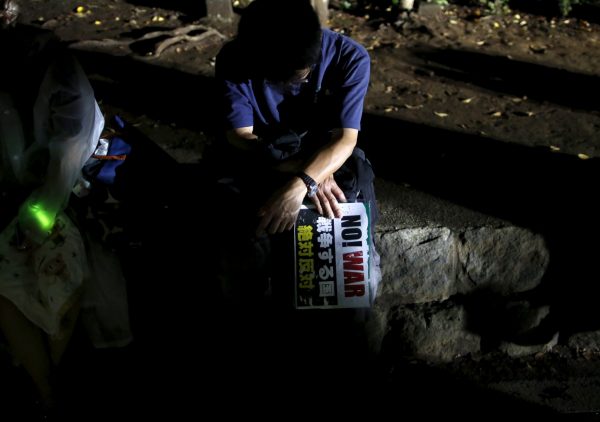The Moritomo land deal issue has sapped Abe’s political capital and limited his capacity to tackle alteration of the constitution. Importantly too, it has not been easy for Abe to reach agreement with the LDP’s coalition partner, the Komeito, on a draft amendment. Nor has his committee on constitutional change discussed it in any detail with resistant opposition parties, let alone convinced a majority of voters to say ‘yes’ in a national referendum, required as the final step for constitutional change.
Who knows what will happen next. But the debate in the lead up to the annual LDP convention provides an indication of what’s to come in parliament over the LDP draft proposal for constitutional change.
Opinions among LDP members have split into two groups.
Since June 2017, there have been close to twenty study group meetings held on constitutional change at the LDP headquarters. The most controversial issue is whether Clause 2 of Article 9 of the constitution, which states that ‘land, sea, and air forces, as well as other war potential, will never be maintained’, needs to be removed from the constitution altogether. An Asahi Shimbun poll suggests that more than 60 per cent of constitutional law experts believe that the existence of the Self Defense Force (SDF) is illegal under Clause 2 of Article 9.
Yet Prime Minister Abe firmly holds that the SDF can be codified in Article 9 without changing that clause. This idea constitutes one school of thought in the LDP. The other school of thought, led by Shigeru Ishiba, a former defence minister and a potential LDP presidential candidate in September 2018, insists that Clause 2 of Article 9 needs to be deleted to avoid undermining the constitutional status of the SDF.
The heated debate within the LDP has not turned on these policy questions but has instead been largely shaped by other factors such as factional alignment, the forthcoming LDP presidential election (in effect a contest for the prime ministership) and even a generational gap.
Ishiba is the leader of a small LDP faction with 19 parliamentarians. The chairman of the LDP amendment study group, Hiroyuki Hosoda, is a factional leader who has a close political relationship with Abe because Abe used to be a member of this faction, though he left it when he was elected LDP president. Hosoda has been pushing hard through the constitution study group to deliver on what he understands to be Abe’s objective.
Seishiro Eto, another former defence minister and a Hosoda faction adviser, has also played a key role as a senior member of the party with deep involvement in national defence matters. Although Eto at first sided with Ishiba, he backed away from deletion of Clause 2 and suddenly asked Hosoda to close down the debate just before the annual convention on 25 March. There was strong resistance to shutting the debate down from the Ishida camp and its allies. Dietman Ryosei Akazawa called on Hosoda to keep the debate open. At the closing meeting of the study group a couple of days prior to the LDP convention, Yoshio Kimura from the Ishihara faction, which is close to Ishiba’s group, kept opposing any resolution of the issue by holding onto the microphone even after the meeting had wrapped up and the matter had apparently been settled.
The debate has seen little exchange on the substance of the constitutional revision issue and few are likely to have changed their views in the process. The ructions have been along factional lines and around which candidate is preferred for the party presidency.
Another feature has been the absence of Japan’s new generation of leaders from the debate. The many promising young aspirants to ministerial posts — and even the prime ministership — such as Shinjiro Koizumi, Yuko Obuchi and Tatsuo Fukuda never attended any of the meetings to discuss the constitutional amendment. They appear to have little interest in the debate and how to position the SDF as an asset to protect and secure Japan.
Despite the ritual of the debate within the LDP, what’s clear is that the LDP draft as it now stands is not necessarily representative of all in the ruling party, especially its younger members and future leaders.
At the close of the LDP study group sessions Abe’s proposal defeated Ishiba’s — meaning LDP policy now supports the addition of the term ‘SDF’ to Article 9 of the constitution. Abe’s proposal has officially passed muster through the party’s decision-making process. But Abe may yet have to take into consideration other factors including the views of those crucial LDP members who were absent from the debate. And there is also the position of coalition partner Komeito and the opposition parties.
A consensus on constitutional amendment within the LDP itself, let alone among the majority lawmakers in the Japanese parliament, still seems a very long way off.
Purnendra Jain is Professor of Japanese Studies at the University of Adelaide.
Takeshi Kobayashi holds a Master’s degree in International Relations from American University, Cairo and is a staffer to a House of Councillors member of the Japanese Diet.

